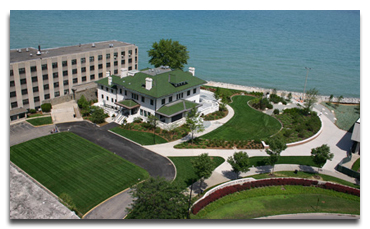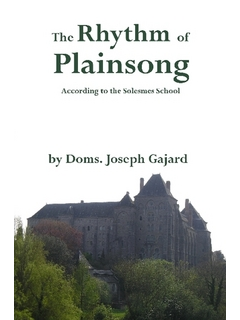“Six Days of Musical Heaven”
June 16-21, 2008 (Monday noon through Saturday evening)
Loyola University, Chicago, Illinois
Sponsored by the Church Music Association of America
2008 Preliminary Schedule
Register online or by mail
Download the poster or brochure
Gregorian Chant has been called the most beautiful music this side of Heaven. But as Pope Benedict XVI and the Second Vatican Council have emphasized, it is also integral to Catholic liturgical life and should be heard and experienced with wide participation in every parish. The Church Music Association of America is working to bring about this ideal with its Sacred Music Colloquium.
 We can’t be more thrilled about the location. Loyola University was founded as a Jesuit college in 1870. Its campus is located in a Chicago suburb (Evanston) that filled with lovely gardens, and sits right on Lake Michigan (our chapel is right on the lake!). It is a large university with 25,000 students and all facilities are modernized, yet it retains a retreat-like environment. Its staff is honored and excited to be hosting the Colloquium. The rehearsal rooms are spacious and glorious, and the dining halls are outstanding. The newly renovated chapel features soaring lines and live acoustics. The dorms are apartment-style, modern, and comfortable for everyone.
We can’t be more thrilled about the location. Loyola University was founded as a Jesuit college in 1870. Its campus is located in a Chicago suburb (Evanston) that filled with lovely gardens, and sits right on Lake Michigan (our chapel is right on the lake!). It is a large university with 25,000 students and all facilities are modernized, yet it retains a retreat-like environment. Its staff is honored and excited to be hosting the Colloquium. The rehearsal rooms are spacious and glorious, and the dining halls are outstanding. The newly renovated chapel features soaring lines and live acoustics. The dorms are apartment-style, modern, and comfortable for everyone.
But please know this: in 2007, the colloquium reached its capacity two months before the deadline. One reason for holding the Colloquium at Loyola is to accommodate more people. But even so, we must cut off registrations at a certain number. We have no idea when that number will be reached. But this conference has become the most in-demand sacred music gathering in the world, so you are well advised to register as early as possible.
The primary focus of the Colloquium is instruction in chant and the Catholic sacred music tradition, participation in chant and polyphonic choirs, nightly lectures and performances, along with daily celebrations of liturgies in both English and Latin.
Attendance is open to anyone interested in improving the quality of music in Catholic worship. Professional musicians will appreciate the rigor, while enthusiastic volunteer singers will enjoy the opportunity to study under an expert faculty. If you have never sung chant before, the colloquium will open a new world of beautiful sacred music to you, so you too are encouraged to attend.
Attendees also benefit from camaraderie with like-minded musicians who share their love of the liturgy of the Church. Growing awareness and appreciation of chant and its solemnity has generated particular excitement about the conference this year.
“The greatest need of liturgy today is the restoration of the sense of the sacred,” writes CMAA President William Mahrt of Stanford University. “Music has a principal role, since it expresses that sense of the sacred and sustains it through time.”
A FEW COMMENTS FROM HUNDREDS:
“I still can’t get over the unforgettable experience of attending the Colloquium. It was a real eye-opener and has enriched me musically, spiritually and intellectually. The instructors were excellent! The food and entertainment were great! The Masses were heavenly! I am already looking forward to the next one and hope I could bring along more people to help in restoring the Church’s musical and liturgical treasures.” Edwin Fernandez
“Thank you from the bottom of my heart for the wonderful work you all put into the Colloquium. This was my second year attending and I thoroughly enjoyed myself. The information was great, the conducting was amazing and the organization was fabulous. I had tears in my eyes several times during the Masses… I attended the colloquium last year as a volunteer musician at our parish and this year I attended as music director for our parish. I was hired three months ago and since then we have completely revamped our 11:30 Mass. Our pastor and I did a ton of education through bulletin inserts and preaching. I immediately formed a schola….”
“It was a wonderful experience for me, truly six days of heaven, and I will never forget it. I particularly enjoyed the conducting class, and the polyphony rehearsals, the lectures and organ performances and improvisations, all the Masses, of course. In short, everything that I attended. I know that this success did not come without a tremendous amount of work on everyone’s part…” Dove Pierce
“The CMAA Colloquium has now indisputably claimed a place among prestigious and well-run music conferences. You will certainly want to attend next year’s event – this was my first time, and the experience was overwhelmingly positive!” Gary Penkala, Cantica Nova Publications
LODGING AND FOOD: The Loyola University dormitories are very comfortable and livable. They are designed in an apartment style and each room or set of two rooms has a bathroom (so no walking down the hall). They come with linens, pillows, soap, and shampoo in each bathroom. The dining hall is located directly across the street, and features a wide variety of American and foreign cuisine, prepared with care. For those who choose the day rate, you can stay in one of many retreat houses or hotels in the Chicago area, and pay for whatever meals you choose to eat on a per meal basis (at extremely reasonable prices).
REGISTRATION COST
$675 for single room/full program including meals, and materials
$575 for double room/full program, including meals and materials
$360 tuition only, including materials (you can pay per meal as you choose)
A deposit to reserve your spot is $75, with full payment due by May 15, 2008. Register first and then make your deposit here. For full payment, go here. You can also mail this registration form that includes your check or credit card number to: CMAA Colloquium Registration, 920 Sanders St., Auburn, AL, 36830.
Some scholarships for Church musicians may be available. Write us with all relevant details, including your financial need. If you would like to assist a musician to acquire the skills and inspiration needed to restore sacred music to an honored place in Catholic liturgy, and earmark your payment to scholarships.
If you need help posting these items, or have further questions, please write us.
 We can’t be more thrilled about the location. Loyola University was founded as a Jesuit college in 1870. Its campus is located in a Chicago suburb (Evanston) that filled with lovely gardens, and sits right on Lake Michigan (our chapel is right on the lake!). It is a large university with 25,000 students and all facilities are modernized, yet it retains a retreat-like environment. Its staff is honored and excited to be hosting the Colloquium. The rehearsal rooms are spacious and glorious, and the dining halls are outstanding. The newly renovated chapel features soaring lines and live acoustics. The dorms are apartment-style, modern, and comfortable for everyone.
We can’t be more thrilled about the location. Loyola University was founded as a Jesuit college in 1870. Its campus is located in a Chicago suburb (Evanston) that filled with lovely gardens, and sits right on Lake Michigan (our chapel is right on the lake!). It is a large university with 25,000 students and all facilities are modernized, yet it retains a retreat-like environment. Its staff is honored and excited to be hosting the Colloquium. The rehearsal rooms are spacious and glorious, and the dining halls are outstanding. The newly renovated chapel features soaring lines and live acoustics. The dorms are apartment-style, modern, and comfortable for everyone.
The Chabanel Psalms
For musicians working within the modern use of the Roman Rite, there is now a free resource for the Responsorial Psalm: The Chabanel Psalms.